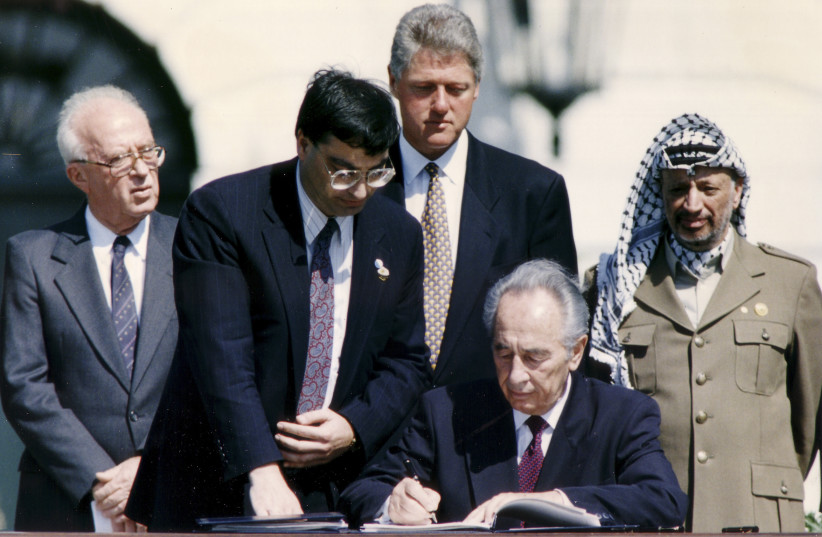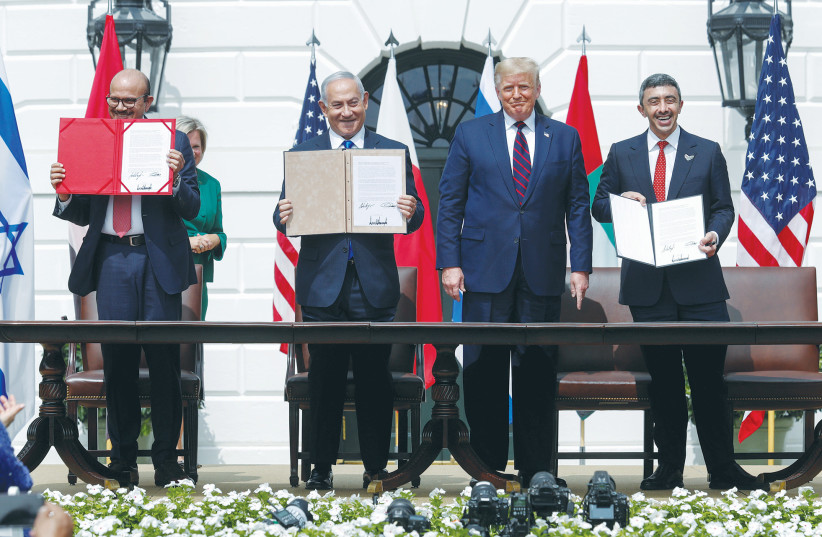The peace treaty with Egypt, in 1979, was believed to be the beginning to the end of the Arab-Israeli conflict. It wasn’t. In 1994, peace with Jordan was considered the key to unlocking the Arab world. This turned out not to be the case. Then there was the Oslo process, which promised the world a dream. A dream that has yet to be realized.
In 2000 and 2008, Israeli peace offers at Camp David and Taba, respectively, would have ended the occupation with no settlements in the West Bank and given rise to a Palestinian capital in east Jerusalem. Still, the Palestinians rejected these offers of independent statehood and, consequently, the outcome was much the same.
Israel and Israeli’s came to realize that peace is not the most important thing in human affairs. Survival is more important, security is more important, liberty and freedom are more important, dignity and honor are more important, and constitutional democracy is more important.
One shouldn’t be willing to sacrifice any of the above in order to achieve peace. Jews should not make peace because self-appointed humanitarians will love us or because it will relieve accumulated Arab or Palestinian stress at being consistently defeated by the lowly Jew.
We should want peace because peace is good for the Jew. There is no need to open one’s eyes in the morning proclaiming out of goodwill “We are guilty!” and then bask in complexities asking ourselves of what we are guilty.

We should want peace because the killing of Jews will stop, Israel’s economy will prosper, unemployment will decrease, Israel’s democracy will grow stronger and its standards of civil service will reach heightened levels. Any calls for Jews to sacrifice or even risk sacrificing Jewish vital interests in the name of peace should be rejected. Self-sacrifice is the most grotesque form of human sacrifice, and for good reason. All forms of human sacrifice, whether physically or spiritually, have been erased from human civilization for centuries.
In 2020, a decades-old paradigm that had consistently linked Israeli peace with Arab states to a resolution of the Israeli-Palestinian conflict was broken with the Abraham Accords. This is not the dream of peace that was promised by the Oslo process. The threats to Israel may have actually increased since, because the Arab enemy of yesterday was far less dangerous than the Iranian enemy of today. Nor does it mean that the radical Arabs fighting Israel are any less determined or ruthless.
What is new is Israel’s success in breaking the pan-Arab front against it and in convincing most Arab countries that a strong Israel is not a threat, rather an essential condition for their survival. While the region remains rife with violence and instability, the axis of struggle is not between Israel and the Arabs, it is between an Arab-Israeli coalition on the one hand, and Iran’s Islamic Revolution and terror proxies on the other.

But how did the Arabs arrive at a point where they even entertained the idea of peace with the Jews? I believe Arab peace with the Jews has less to do with the Jews and more to do with a fracture within the Arab world itself. The Abraham Accords shed light on a new discourse emerging in the Arab world that seeks to challenge some of the old dogmas that have dominated the region for the last few decades.
A decade of turmoil that followed what was dubbed as the Arab Spring finds a divided region, full of ethnic and religious conflict, ungoverned territories, and the growing reality of failed states. An axis of resistance, led by radical elements from both the Shia and the Sunni world, is perceived as a growing challenge to a group of actors led by a number of Gulf countries who identify radicalization as an existential threat.
A new axis of renaissance
FACING THE axis of resistance, a new axis of renaissance is coming of age with an alternative vision that seeks to change the face of the Middle East. In parallel to the rapid decline of the traditional Arab capitals, the Gulf is emerging as a more significant voice in the region due to its economic, political and media influence.
To understand the Abraham Accords from the Arab perspective, it is vital to understand this new Gulf-led renaissance and the early formulation of a new agenda of a more tolerant Middle East through a radical reshuffling of the order of priorities in the region.
While the move to make peace with the Jewish state was certainly not welcomed in every corner of the broader Middle East, it was also not rejected, as was the case with Egypt, which found itself expelled from the Arab League after signing its peace treaty with Israel. After all, much has changed since Egypt began the path of peace with Israel, in the late 1970s.
Today, over half of the Arab population lives in countries that have normalized relations with Israel, while much of the other half lives in failing states. This illustrates the dichotomy between those who hold an affinity toward a path of progress and tolerance, which appears to yield prosperity, as opposed to those who continue to uphold sectarian and conflict-driven politics, despite decades of carnage and chaos.
The current trajectory of Arab public opinion is leading toward what could easily be called moderation: rejecting religious extremism, opposing Iran’s hegemonic ambitions and proxies, accepting peaceful normalization with Israel and the Jews, and to look for pragmatic steps forward rather than sweeping ideological movements in most areas of public life. This trend is particularly true of the younger generation under the age of 30, which represents more than half of the Arab population today.
The main discourse shift related specifically to recent Saudi-Palestinian disputes or the Gulf’s abandonment of the Palestinian war against Zionism should be understood as a change in the broader Arab discourse, which is being framed and executed for an enlightened future. The Palestinian cause was a convenient tool for autocratic dictators seeking a convenient scapegoat, and there is no greater scape-goat then the Jews.
This was useful for Islamic radicals who found it to be a simple rallying point. However, when Islamism became the main threat and Iran (which continues to rally Palestinian resistance and rejection) became a major concern, these dissenting voices became synchronous with the new emerging regional thinking, which no longer accept Islamists or Iranian sympathizers - Palestinians among them.
The current success of the Abraham Accords leads to an opportunity of greater regional possibilities and a clearly defined strategic approach to further peace with a changing Arab world. Future deals must be based on the same robust strategy of peace-making that opened the path to peace with the United Arab Emirates, Bahrain and Morocco. The first principle pertaining to future peaceful relations with the Arab world should be what is good for the Jews and the Arab world should be what is good for the Arabs.
No rational person, peoples or nation wants something unless it is good for them. Jewish relations with the Arab world must be fair but firm, with an unconditional demand for reciprocity. What we demand from ourselves regarding the Arabs, we must demand from the Arabs regarding ourselves. Without fairness, we will not achieve peace. Without firmness, we will not survive.
The writer is a research fellow at The Institute for Monitoring Peace and Cultural Tolerance, based in Tel Aviv. He is a contributing writer/editor of the book We Should All Be Zionists with former MK Dr. Einat Wilf.
